Related Research Articles
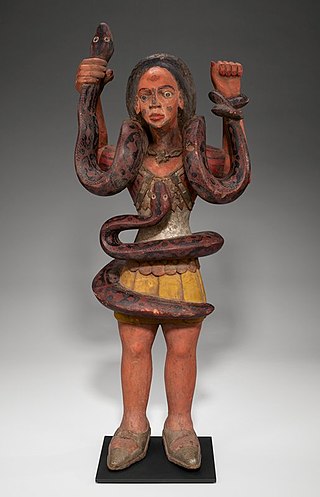
A Simbi is a Central African water and nature spirit in traditional Kongo religion, as well as in African diaspora spiritual traditions, such as Hoodoo in the southern United States and Palo in Cuba. Simbi have been historically identified as water people, or mermaids, pottery, snakes, gourds, and fire. Due to the forced removal of Bantu peoples from Africa to the Americas, the veneration of simbi exists today in countries, such as the United States, Brazil, Cuba, and Haiti.

Joseph Kasa-Vubu, alternatively Joseph Kasavubu, was a Congolese politician who served as the first President of the Democratic Republic of the Congo from 1960 until 1965.

Zaire is one of the 18 provinces of Angola. It occupies 40,130 square kilometres (15,490 sq mi) in the north west of the country and had a population of 594,428 inhabitants in 2014. It is bordered on the west by the Atlantic Ocean, on the north by the Democratic Republic of Congo, on the east by the Uíge Province, and on the south by the Bengo Province.

Kongo Central, formerly Bas-Congo, is one of the 26 provinces of the Democratic Republic of the Congo. Its capital is Matadi.
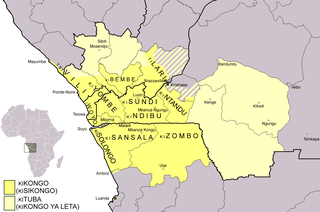
Kongo or Kikongo is one of the Bantu languages spoken by the Kongo people living in the Democratic Republic of the Congo (DRC), the Republic of the Congo, Gabon, and Angola. It is a tonal language. The vast majority of present-day speakers live in Africa. There are roughly seven million native speakers of Kongo in the above-named countries. An estimated five million more speakers use it as a second language.
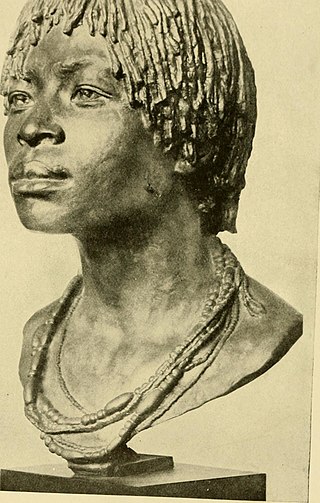
The Kongo people are a Bantu ethnic group primarily defined as the speakers of Kikongo. Subgroups include the Beembe, Bwende, Vili, Sundi, Yombe, Dondo, Lari, and others.

The culture of the Democratic Republic of the Congo is extremely varied, reflecting the great diversity and different customs which exist in the country. Congolese culture combines the influence of tradition to the region, but also combines influences from abroad which arrived during the era of colonization and continue to have a strong influence, without destroying the individuality of many tribal customs.

The Kingdom of Kongo was a kingdom in Central Africa. It was located in present-day northern Angola, the western portion of the Democratic Republic of the Congo, southern Gabon and the Republic of the Congo. At its greatest extent it reached from the Atlantic Ocean in the west to the Kwango River in the east, and from the Congo River in the north to the Kwanza River in the south. The kingdom consisted of several core provinces ruled by the Manikongo, the Portuguese version of the Kongo title Mwene Kongo, meaning "lord or ruler of the Kongo kingdom", but its sphere of influence extended to neighbouring kingdoms, such as Ngoyo, Kakongo, Loango, Ndongo, and Matamba, the latter two located in what is Angola today.
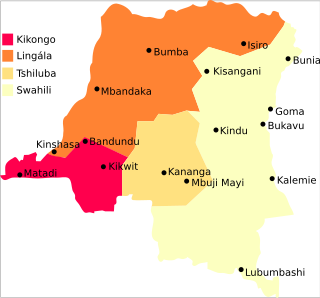
The Democratic Republic of the Congo is a multilingual country where an estimated total of 242 languages are spoken. Ethnologue lists 215 living languages. The official language, since the colonial period, is French, one of the languages of Belgium. Four other languages, all of them Bantu based, have the status of national language: Kikongo-Kituba, Lingala, Swahili and Tshiluba.
Kituba is a widely used lingua franca in Central Africa. It is a creole language based on Kikongo, a Bantu language. It is a national language in Republic of the Congo and Democratic Republic of the Congo.
Jean Cuvelier (1882–1962) was a Belgian Redemptorist missionary and bishop of Matadi in Belgian Congo from 1930 until his death in 1962. Cuvelier was notable for his interest in the history of the Kingdom of Kongo, which he saw as a route to evangelization in his time. By stressing the Christian nature of the old kingdom, he hoped to increase the attachment of Kongo parishioners to the Catholic Church as opposed to Protestantism or traditional religions.

Lukeni lua Nimi was the traditional founder of the Lukeni kanda dynasty, first king of Kongo and founder of the Kingdom of Kongo Dia Ntotila. The name Nimi a Lukeni appeared in later oral traditions and some modern historians, notably Jean Cuvelier, popularized it. He conquered the kingdom of Mwene.
Nsi Kwilu is a modern Kikongo respelling of "Essiquilu" the term used by the Italian Capuchin missionary Girolamo da Montesarchio in 1650 for the territory along the Kwilu River near Matadi in the modern-day Democratic Republic of Congo.

The Republic of the Congo was the period of the history of the Democratic Republic of the Congo between 1960 and 1971. Located in Central Africa, the state was created with the independence of the Belgian Congo in 1960. From 1960 to 1966, the country was also known as Congo-Léopoldville to distinguish it from its northwestern neighbor, which is also called the Republic of the Congo, alternatively known as "Congo-Brazzaville". In 1964, the state's official name was changed to the Democratic Republic of the Congo, but the two countries continued to be distinguished by their capitals; with the renaming of Léopoldville as Kinshasa in 1966, it became also known as Congo-Kinshasa. After Joseph Désiré Mobutu, commander-in-chief of the national army, seized control of the government in 1965, the Democratic Republic of the Congo became the Republic of Zaire in 1971; but it was reverted back to the Democratic Republic of the Congo in 1997. The period between 1960 and 1964 is referred to as the First Congolese Republic.
Nkutama a mvila za makanda is a "Catalogue of Praise Names of Clans" in the Kikongo language compiled and edited by Father Jean Cuvelier comprising a list of about 500 Kongo clans in alphabetical order. The list was compiled by Cuvelier between 1926 and 1934 when he was inspector of schools for the Redemptorist Order in the Belgian Congo. The entries typically give the name of the clan, its praise name or mvila, as well as its traditional itinerary and sometimes additional information drawn from its traditions. Often Cuvelier specified the village where he collected the tradition as well.

The Lari is an ethnic group of the Republic of the Congo and the name of the language they speak. A subgroup of the Kongo people, the Lari live in the communes of Brazzaville, the capital; and Pointe-Noire, and within the surrounding Pool Department. This subgroup was born in the 19th century. where they constitute almost the entire population. There are an estimated 1.2 million Lari living in Congo.

The official language of the Republic of Congo is French. Other languages are mainly Bantu languages, and the two national languages in the country are Kituba and Lingala, followed by Kongo languages, Téké languages, and more than forty other languages, including languages spoken by Pygmies, which are not Bantu languages.
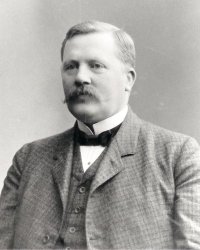
Karl Edvard Laman (1867–1944) was a Swedish missionary and ethnographer active in Kingdom of Kongo during the period of 1891 through 1919. Laman and his wife collected a large group of ethnographic materials and this collection of more than 2,000 pieces is the most comprehensive of that brought back by the Swedish missionaries of his time.

The Alliance of Kuminga was a Congolese political party, founded by Edmond Nzeza Nlandu, but headed by Joseph Kasa-Vubu, which emerged in the late 1950s as vocal opponent of Belgian colonial rule in what today is the Democratic Republic of the Congo. Additionally, the organization served as the major ethno-religious organization for the Kongo people and became closely intertwined with the Kimbanguist Church which was extremely popular in the lower Congo.
References
- ↑ Heimlich, Geofffroy (2017). Joseph de Munck in Le massif de Lovo, sur les traces du royaume de Kongo (in French). Archaeopress. p. 21. ISBN 9781784916350.